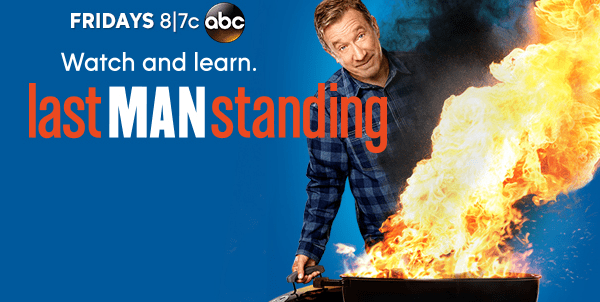 This has been a tough year for anyone who values courtesy in the public sphere. It appears that our nation is plagued by anger and arrogance, a fatal combination to decency, civility and maybe to democracy itself. (No, I’m not whining – geez, you’re judgmental!) There’s no way we are giving in to despair, though, because this is not a nation of quitters, am I right?
This has been a tough year for anyone who values courtesy in the public sphere. It appears that our nation is plagued by anger and arrogance, a fatal combination to decency, civility and maybe to democracy itself. (No, I’m not whining – geez, you’re judgmental!) There’s no way we are giving in to despair, though, because this is not a nation of quitters, am I right?
That’s certainly what America’s cheerleader from the right would say. I’m talking about Outdoor Man Mike Baxter, played with panache by Tim Allen on ABC’s comedy Last Man Standing. In a year of polarized passions, Tim Allen gives us political humor from a manly man, a gun loving Republican who makes ridiculing the liberal left look easier than shooting ducks in a barrel (or is it fish? Whatever!) and way more fun. I’ve personally felt the sting of a well-aimed BB pellet of a joke more than once. But on Last Man Standing not even Mike Baxter is let off the comedic hot seat. An open and unapologetically conservative off stage, Tim Allen has the grace to poke fun at his own passionately held convictions. In the deft hands of this family friendly comedy, the right and the left are both hilarious – who knew?!
Meet Mike Baxter, Confirmed Grouch. You’ll Like Him!
Truth be told, Mike can be a teensy bit grouchy. He has little tolerance for those who do not value the manly virtues of rugged individualism, stoic reserve and speaking your mind. The idea of getting in touch with your feelings makes him squirm. He happily declares that liberals, political correctness, and safe spaces are just stupid. And if your feelings get all hurt by being called stupid, well, Mike will wonder out loud, to your face, how you’ll react when something really bad happens to you, like you lose your job or someone steals your morning paper. Insensitivity, thy name is Mike Baxter.
You may not immediately recognize this as a virtue, but Mike Baxter (and I’m guessing this is also true of Tim Allen himself) is not afraid to piss people off. In fact, we could say that he has a finely calibrated internal bullshit detector. Mike calls it like he sees it, and if he offends someone or loses their friendship, he’s okay with that.
I’m nothing like this! I avoid conflict like the plague and would rather agree with bullshit than offend the bullshitter. So Mike can make me very, very uncomfortable. But Mike’s irascibility focuses our attention on a very human reality: that what others think about us matters to almost everyone but Mike Baxter. But even Mike learned about himself as a child the way we all do, from the feedback we get from others. We learn that we are smart, friendly, generous, funny, and lovable because we get that feedback from those around us. Loving or critical gazes, laughter or mockery teach us that we are smart or stupid, friendly or shy, generous, funny, lovable – the list goes on. The point I’m trying to make here is that we are not born with a fully developed sense of self. Our identity develops over time in response to and in relationship with the world around us. This very relational way of becoming someone is an essential characteristic of being human.
Two False Paths to Identity
But being human is not all roses and champagne! If we never develop a sufficiently strong sense of self like Mike Baxter we may begin grasping after positive feedback in situations that are doomed to failure. Why? Because positive feedback – in other words, love – is something that is freely given; you can’t force someone to give it to you. Parents love their children just because. Friends stick with us not because we are perfect, but because they are our friends. When we have to start acting a certain way or hiding our feelings or opinions in order to keep our friends, that’s a sure sign we need new friends. Mike Baxter is secure enough in his own skin that negative reactions don’t send him into an identity crisis. Maybe we don’t need to enjoy it quite as much as Mike does, but not being afraid to piss people off is a sign that you are not trying to force someone to love you. Which is a good thing!
Weirdly, the dependence on feedback works in reverse, too. When we are against someone or some group we are strangely enough still dependent on their opinion of us for our sense of self. Only now instead of their approval, we need to be free to hate them with every fiber of our being. We do that by making them into the bad guys while we play the role of virtuous good guys. In fact, hating those wicked others is a clear sign of our goodness! Partisan politics, anyone?
Mike Baxter and I both agree that there are real bad guys in this world. But getting stuck in an over against identity is a terrible way to find out who they are. In fact, it is one way good people get caught doing very wicked things without even realizing it. How? Because the wrong people can get caught up in our ego-boosting campaigns as easily as the wicked ones. When we care more about our own ego needs than the wellbeing of others, it’s called scapegoating. When that happens, we have become part of the evil we seek to rid the world of. But scapegoating is not grouchy Mike’s problem, either. He doesn’t need other people to disagree with him. If they do, he figures not being in relationship with him is their loss, not his.
Free to Be Me
Because Mike is not dependent on positive or negative feedback, he is free to be himself and the people in his life are free, too. Which is why Mike’s interactions with his family, friends, and co-workers offer us a glimpse of what healthy relationships look like. They aren’t free of conflict or serious disagreements or real differences of opinion. But the self-assured Outdoor Man is so confident about who is that he is capable of the thing that defines the best of who human beings can be: he can change. A secure identity is not a fixed thing like a stone carving at Mount Rushmore. A secure identity allows us to listen and learn from others, especially others who get on our nerves. A secure identity allows Mike Baxter to be open to change and to mature into a better person. I know it sounds strange that a character who values toughness can demonstrate such vulnerability, but there it is.
There is a lot more to say about this show, too much for one column. But I’d like to add an observation about one other character who is the opposite of Mike’s in almost every way. It’s Kyle Anderson, the naïve, caring, sensitive employee at Mike’s store. Kyle doesn’t hurt anyone’s feelings ever. Mike is often his insensitive, grumpy worst self with Kyle. He teases Kyle relentlessly and the ongoing ridicule of this sweet character is a running gag on the show. If Kyle needed positive feedback he’d be in big trouble! With saint-like generosity of spirit, Kyle never gets angry or resentful. He returns Mike’s ridicule with love and admiration. It’s as if Kyle is willing to occupy the role of scapegoat for Mike so he can get a harmless ego boost at Kyle’s expense.
So what makes the Mike-Kyle relationship healthy and not abusive? Because though Mike has a jolly good time putting Kyle down, he also learns from him and even comes to admire and value Kyle’s worldview. Mike allows himself to be changed by the one person he thinks has nothing to offer him. Mike and Kyle represent two sides of a healthy ego: freedom to be yourself regardless of the social consequences, and a generosity of spirit that can give the hard won self away as a gift to others.
You Can’t Be Right If You’re Never Wrong, Stupid!
Last Man Standing lovingly dramatizes a truth about human relationships, that when we can find the grace to laugh at ourselves, we make space for ourselves to be a little bit wrong and our so-called enemies to be a little bit right. God knows America faces real problems right now, both global and local, that will need the talents and political will of all Americans working together to solve. We need to be able to call one another out when needed and back each other up, too, but not react based on party affiliation or how we voted. We need to ground our responses in a reality that is not distorted by our ego needs. And most of all, we need to be willing to be changed by and through our relationships with one another. Mike Baxter may be an arrogant know-it-all, but the beauty of the show is that Mike listens and learns from the people in his life who he thinks are stupid. It’s something we all need to learn how to do.
Image: Courtesy of Tim Allen’s Facebook Page.
Stay in the loop! Like Teaching Nonviolent Atonement on Facebook!











